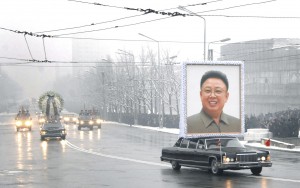WASHINGTON—Late North Korean strongman Kim Jong-Il enjoyed an elaborate personality cult at home but he was also a favorite of Western popular media, which found him to be a time-tested source of laughs.
From Hollywood to websites, satirists relished skewering a leader whose shrill missives to the world, intolerance for any dissent and bouffant hairstyle made him—at times literally—a cartoon villain.
Kim, who is to receive a massive funeral send-off on Wednesday, was spoofed on Fox’s MADtv as a talk show host who raps about his pursuit of nuclear weapons and gleefully shoots petrified cast members who do not follow his every wish.
Even more incongruously, a website dubbed “Kim Jong-il Dropping the Bass” depicts the usually humorless dictator as a nightclub DJ, ceding the spotlight to revelers as he devotes himself to the turntables.
Kim’s death has immediate consequences for one US show, NBC’s “30 Rock,” where a fictional Kim kidnapped a character. Fans have been asking on social media how the show will adapt.
‘Tragic comedy’
Margaret Cho, the Korean American actress who has played Kim on “30 Rock,” wrote on her blog that while the role was obviously comedic, she felt a sense of tragedy when she donned his trademark jumpsuit.
“My heart broke for a country cut off from the rest of the world, whose only representative is a crazed megalomaniac who fancies himself a polymath… who cannot only play the most incredible golf, he also directs films and is half man-half deity—also half-size—as well as being a full-time dictator,” she said.
Perhaps the best-known satire of Kim Jong-il was in the 2004 movie “Team America: World Police,” a biting take on US foreign policy by Trey Parker and Matt Stone, creators of the popular animated series “South Park.”
Kim, in marionette form, feeds UN weapons inspector Hans Blix to sharks, plots to carry out bombings across the world and organizes a “peace ceremony” led by actor Alec Baldwin.
Polar opposite
At one point, Kim wanders sullenly around his palace and sings a Broadway-style tune called, “I’m So Lonely.” He croons: “I’m the smartest, most clever, most physically fit / But nobody else seems to realize it.”
The mockery stands in polar opposite to North Korean official media, which faithfully reported the strongman’s supposed exploits such as firing 11 holes-in-one in his first try at golf.
The state media coverage in itself has generated a following overseas. One blog entitled “Kim Jong-il Looking at Things” collects pictures of the leader’s inspections of everything from toilet paper to fruit as he toured the country.
Joao Rocha, who set up the blog last year at kimjongillookingatthings.tumblr.com, said that the site received four million page-views in the three days after Kim’s death was announced.
Rocha, who is art director for the advertising firm Y&R in Lisbon, Portugal, said he laughed out loud when he first stumbled upon the pictures of Kim but was surprised that his blog has generated so much interest.
“The coat, hat and glasses, of course, but his gaze was the most hilarious part about it. Sometimes he doesn’t seem to understand what the hell he’s looking at,” Rocha said.
No laughing matter
Despite the wide mockery of Kim, not all are having a laugh. The United States and its allies have been careful in official comments on Kim’s death, with North Korea warning South Korea of consequences for any disrespect.
Human rights groups have been highlighting the seriousness of problems in North Korea, saying that Kim is responsible for thousands if not millions of deaths through starvation, executions, forced labor and imprisonment.
And some Asian Americans are uneasy about the media depictions. The humor in “Team America” plays on Kim’s small stature and some Asians’ difficulties distinguishing between the “r” and “l” sounds in English.
Frank H. Wu, chancellor and dean of the University of California Hastings College of the Law and author of “Yellow: Race in America Beyond Black and White,” said that while virtually no Asian Americans sympathize with Kim, the community is sensitive about racial stereotyping.
“When individual Asian foreigners are criticized, as they should be, there is the risk of a group image that adversely affects Asian Americans,” he said.
“Asians often are depicted as inscrutable and mindless in following a leader. Assimilated Asian Americans are accused of the same thing when they participate in politics here: being untrustworthy and not being capable of independent thought.”
